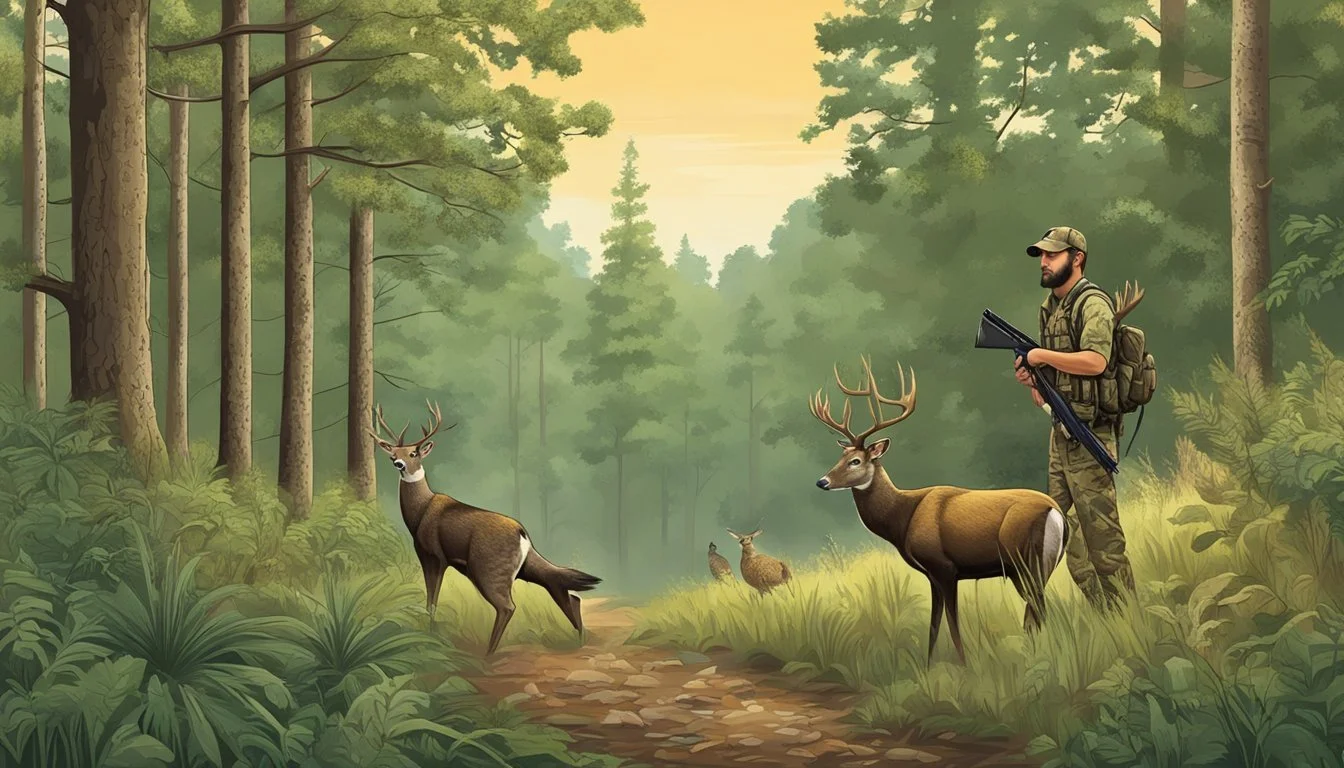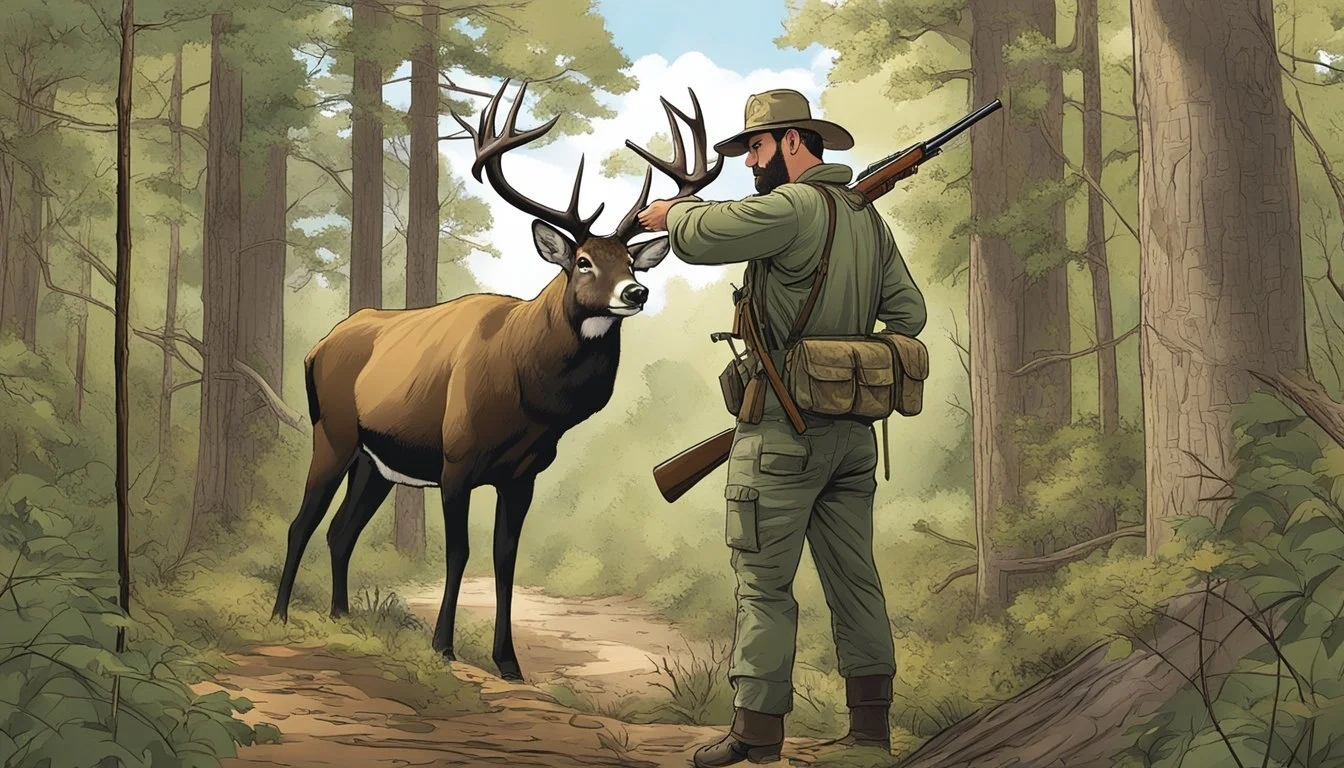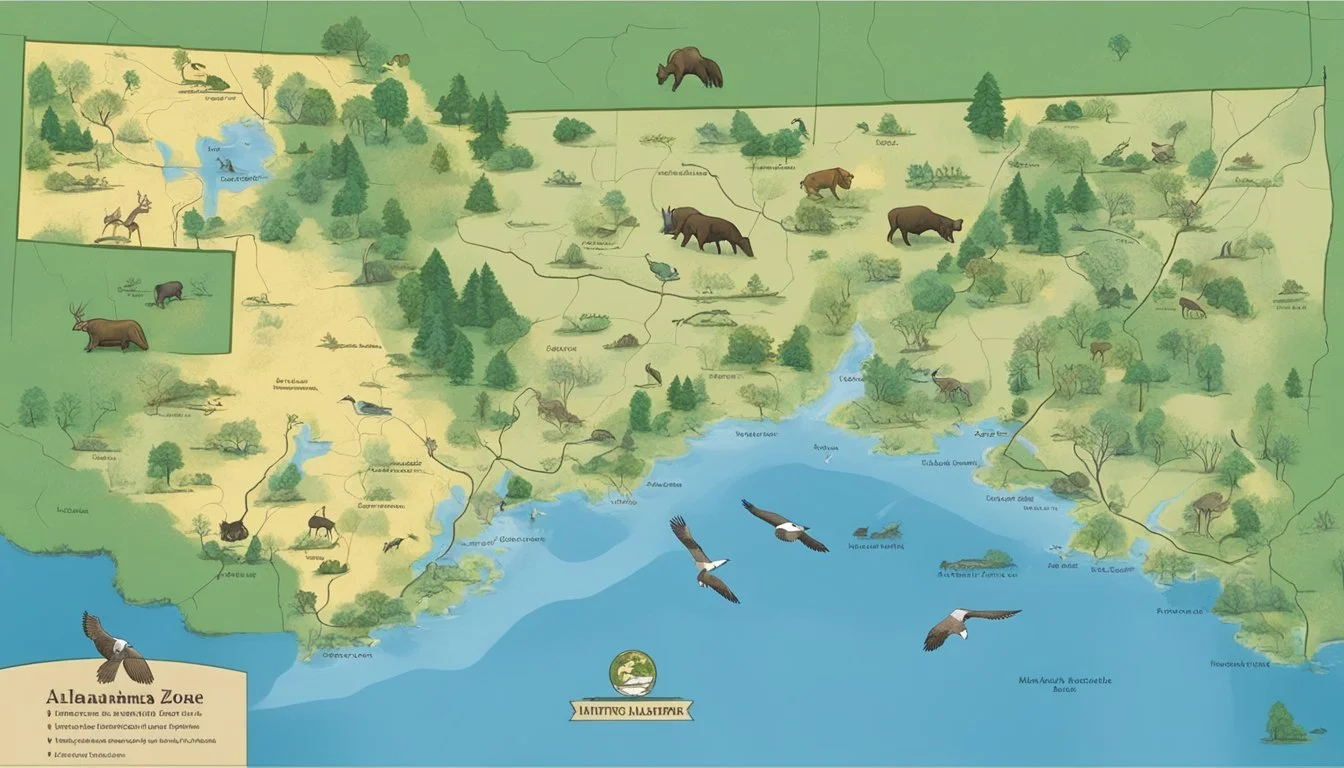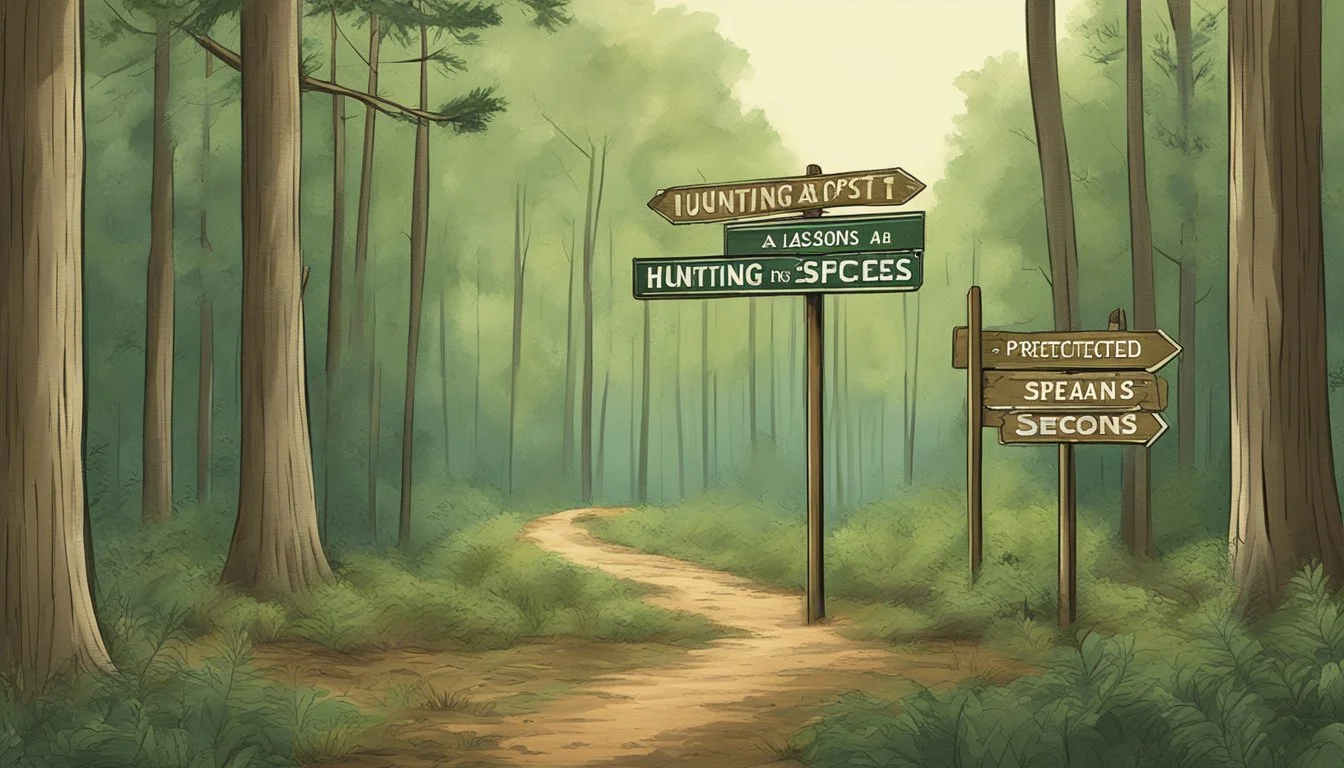Hunting Seasons in Alabama
A Comprehensive Guide for 2024
This Article is Part of Our Hunting Seasons Guide for All 50 US States
Alabama offers a diverse array of wildlife, providing ample opportunity for hunters to engage in the sport across various seasons. The state meticulously regulates hunting seasons to ensure the conservation of wildlife populations while allowing sportsmen and women to participate in this traditional outdoor activity. These regulations cater to a range of species, including white-tailed deer, turkey (What wine goes well with turkey?), feral hogs, squirrels, waterfowl, and more, each with specific seasons and bag limits to adhere to the principles of sustainable wildlife management.
The hunting season schedule is designed to align with the life cycles of the animals and the ecological needs of the environment. For instance, deer hunting seasons take into account the breeding periods and the necessity to manage the population sizes efficiently. Similarly, waterfowl seasons coincide with patterns of migration, ensuring that hunting does not disrupt these natural processes. In addition, certain regulations such as the daytime and nighttime season dates for coyote and feral swine address the need to control non-native species that may pose a threat to Alabama's natural habitats and indigenous wildlife.
Hunters in Alabama are encouraged to familiarize themselves with the latest rules and regulations, which can be found in the Alabama Hunting & Fishing Digest or through the Department of Conservation & Natural Resources. These guidelines are essential for maintaining legal and ethical hunting practices within the state. They are regularly updated to reflect changes in wildlife populations, scientific research findings, and conservation needs, underscoring Alabama's commitment to responsible wildlife stewardship and the preservation of its rich hunting heritage.
General Hunting Regulations in Alabama
The hunting regulations in Alabama are designed to ensure sustainable wildlife populations and to provide a safe, fair, and legal hunting experience. These regulations are enforced by the Alabama Department of Conservation and Natural Resources.
Legal Hunting Methods and Equipment
In Alabama, hunters are permitted to use various hunting methods and equipment including air rifles, archery equipment, muzzleloaders, and firearms. Specific caliber restrictions apply, such as the recent change requiring pre-charged pneumatic air powered guns to be at least .25 caliber for certain species. The use of dogs for deer hunting is prohibited on certain days unless it coincides with Christmas Day or New Year's Day.
Licenses and Permits
All hunters must possess the appropriate licenses and permits which are available for purchase online or through authorized dealers. Upon harvesting game, hunters must immediately record their kill through the Outdoor Alabama app or on their paper harvest record. Youth hunters, public hunting land users, and those hunting within the Chronic Wasting Disease Management Zone have specific regulations and permits.
Conservation and Wildlife Management
The Alabama Department of Conservation and Natural Resources oversees conservation efforts and the management of wildlife populations. Regulations, including hunting dates and bag limits, are part of these management efforts to maintain healthy wildlife populations and ecosystem balance.
Hunting Dates and Seasonal Restrictions
Hunting dates and seasonal restrictions are clearly defined for various species. For instance, the deer season generally includes specific periods for archery, firearms, and muzzleloader hunting. The Alabama hunting season calendar provides these dates as well as information on turkey season and other species.
Safety and Education
Hunters are required to complete a hunter education program, which provides essential safety training and knowledge about hunting ethics and Alabama regulations. This education is crucial for preventing accidents and ensuring responsible hunting practices.
Reportable Diseases and Wildlife Health
Hunters in Alabama play a vital role in monitoring wildlife health. They must report instances of diseases like Chronic Wasting Disease (CWD) which affects deer populations. The state's resources provide guidance on identifying symptoms and reporting procedures within the Chronic Wasting Disease Management Zone.
Big Game Hunting Seasons
Alabama offers a diverse range of big game hunting opportunities, adhering to specific seasons and bag limits designed to maintain healthy wildlife populations and ensure sustainable hunting practices.
Deer Hunting Season
Alabama's deer hunting season is highlighted by the pursuit of white-tailed deer, a cherished game species in the state. Archery deer season generally opens in mid-October, allowing hunters the first opportunity to harvest either sex. Antlered bucks only can be taken in certain management zones starting in late November, continuing through January. Specific dates and regulations may vary by zone, so hunters should consult the local guidelines.
Turkey Hunting Season
Wild turkey hunters anticipate the spring season, typically commencing in March and concluding in April. The state enforces bag limits to ensure a balanced turkey population and sustainable hunting. Again, specific regulations are outlined per management zone, with hunters required to verify the regulations that apply to their chosen hunting location.
Alligator
Alligator hunting in Alabama is subject to strict licensing and often involves a lottery system due to its popularity. The season usually spans a few weeks in late summer, and hunters must adhere to designated hunting hours and size restrictions.
Feral Swine
Feral swine are not protected in Alabama, and hunters can pursue them year-round on private land. There are no bag limits for harvesting these animals, but some public lands may have specific rules and regulations, including required permits or designated hunting seasons.
Small Game and Waterfowl Seasons
Alabama offers a diverse range of hunting seasons for small game and waterfowl enthusiasts. These seasons are regulated to maintain healthy wildlife populations and provide sustainable hunting opportunities.
Squirrel and Rabbit Hunting
Squirrel Season:
Fall: September 15 to March 5
Spring: May 15 to June 1
The bag limit for squirrels is 8 per day.
Rabbit Season:
Open Season: October 1 to March 5
Hunters can take up to 8 rabbits per day.
Game Birds
Bobwhite Quail:
Season: November 5 to February 28
Bag Limit: Daily limit is set at 8 quails.
Dove (including Mourning Dove):
Hunting primarily takes place in the early fall. Dates can vary and should be confirmed with the latest state regulations.
Waterfowl and Migratory Birds
Legal hunting hours extend from one-half hour before sunrise to sunset. Hunters should consult the Alabama Waterfowl Hunting Guide for specific bag limits as these can be subject to change according to federal regulations.
Geese:
Season: (All Geese) September 2 - October 1, October 14 - October 28, November 24 - November 25
Bag Limit: Consult the Alabama Waterfowl Hunting Guide
Teal:
Early teal seasons are typically timed in September. Specific dates and bag limits should be checked each year.
Furbearer Season
Bobcat, Coyote, Fox, Otter, Skunk, Mink, and Muskrat:
These species have varying seasons or may be hunted year-round in some cases. The Alabama Department of Conservation and Natural Resources should be consulted for the most current and specific hunting rules and regulations.
Special Hunting Seasons and Zones
In Alabama, the hunting season is meticulously organized with special seasons and zones targeting specific wildlife management strategies. This ensures sustainable game populations and provides different hunting experiences throughout the state.
Youth Hunting
Alabama dedicates special youth gun seasons to encourage the next generation of hunters. These seasons are designed to provide youths under the age of 16 with the opportunity to hunt in a more controlled environment, often before the regular season opens. Youth hunting dates vary by zone and can include deer, turkey, and other game. Parents or mentors must accompany the youth without hunting for themselves.
Zone A: Specific youth hunting dates apply
Zone B: Youth may hunt during specially designated dates
... (Note: Continue the list for other zones as relevant)
Muzzleloader and Special Weapon Seasons
Various zones in Alabama introduce special muzzleloader seasons, where hunters are allowed to use muzzleloaders and air rifles. These seasons can happen at different times throughout the year depending on the zone. The use of these weapons during these times often coincides with efforts to manage chronic wasting disease by controlling deer populations.
Management Zone specific Seasons:
Zone C & D: Periods when only muzzleloader and air rifles are permissible
Zone E: Offers a distinct season for hunters preferring historical and alternative firearms
Management Zone specific Seasons
Each management zone (Zone A, B, C, D, E) may have tailored seasons to address local wildlife management needs. This can include dog deer hunts or other methods that align with population control objectives.
Zone A: May have longer or special weapon seasons due to high deer densities
Zone B: Could include restrictive measures to deal with chronic wasting disease
...
Hunting licenses are mandatory across all zones, and hunters must ensure they are equipped with the correct permits for the season they are participating in. Special licenses may be required for some special seasons.
Hunting Restrictions and Protected Species
Hawaii's diverse hunting regulations are tailored to each island, considering the local ecosystems and game populations. Visitors and residents need to follow pertinent guidelines to ensure a lawful and sustainable hunting experience.
Lanai Hunting Information
In Lanai, hunters can find opportunities to hunt Black Tail Deer. The island permits hunting methods to be limited by specific regions or units, therefore it is critical to check the current regulations before planning a hunting trip.
Maui Hunting Information
On Maui, the hunting of wild sheep is a regulated activity, with specific areas designated for hunting at certain times of the year. Detailed maps and seasonal information are provided by the Division of Forestry and Wildlife.
Kauai Hunting Information
The Island of Kauai offers hunting seasons for various game. Each area may have distinct regulations, which are essential for hunters to follow for conservation and safety purposes.
Molokai Hunting Information
Molokai's hunting regulations often specify dates and allowable hunting methods for certain units or regions on the island. This ensures hunter compliance with legal standards and resource management.
Oahu Hunting Information
On Oahu, public hunting areas are maintained with rules focusing on hunter safety and environmental considerations. These regulations are designed to provide a balance between outdoor recreational opportunities and the conservation of natural resources.





